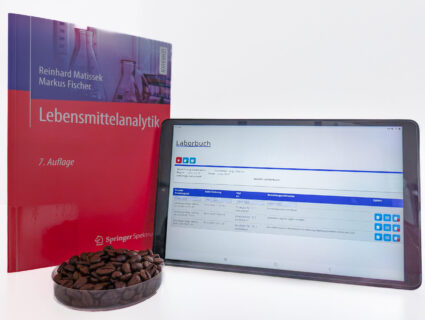Digital Innovation in Education: Flipped Classroom and Electronic Lab Notebooks Transform Food Chemistry Lab Courses
Digital teaching methods are playing an increasingly important role in higher education. To further optimize training in food chemistry lab courses, a combination of the flipped classroom approach and electronic lab notebooks (ELN) has been developed. This innovative concept enhances the efficiency of laboratory work, improves the learning process, and prepares students for the needs of modern scientific and industrial work environments.
In the flipped classroom model, theoretical knowledge is no longer taught exclusively in in-person lectures but are instead taught through specially designed digital learning materials that students study independently in advance. This allows valuable in-person lab time to be used for in-depth discussions, individual supervision, and hands-on applications. The integration of an ELN further enhances this approach: students can better structure their preparation, document experiments in real time, and systematically record their results. This not only improves data traceability and reproducibility but also facilitates collaboration with instructors and fellow students.
The combination of both methods offers significant advantages. It not only ensures more thorough preparation for lab exercises but also strengthens digital competencies—an essential qualification in modern science and industry. Furthermore, digital documentation enhances transparency and quality assurance in experimental work.
The implementation of this innovative teaching strategy has been thoroughly evaluated. The results, recently published in the Journal of Chemical Education, confirm its positive impact: students benefit from improved preparation, structured documentation, and greater personal responsibility in the lab. Moreover, integrating the flipped classroom approach with an ELN into a “Flipped Lab” not only deepens the understanding of complex experimental procedures but also fosters essential soft skills that are crucial for future professional careers.
Further Information:
https://pubs.acs.org/doi/full/10.1021/acs.jchemed.4c01082
Contact:
Dr. rer. nat. Sabrina Gensberger-Reigl
Department of Chemistry and Pharmacy
Chair of Food Chemistry / Henriette Schmidt Burkhardt (Prof. Dr. Pischetsrieder)
- Phone number: +49 9131 85-65600
- Email: sabrina.gensberger@fau.de

